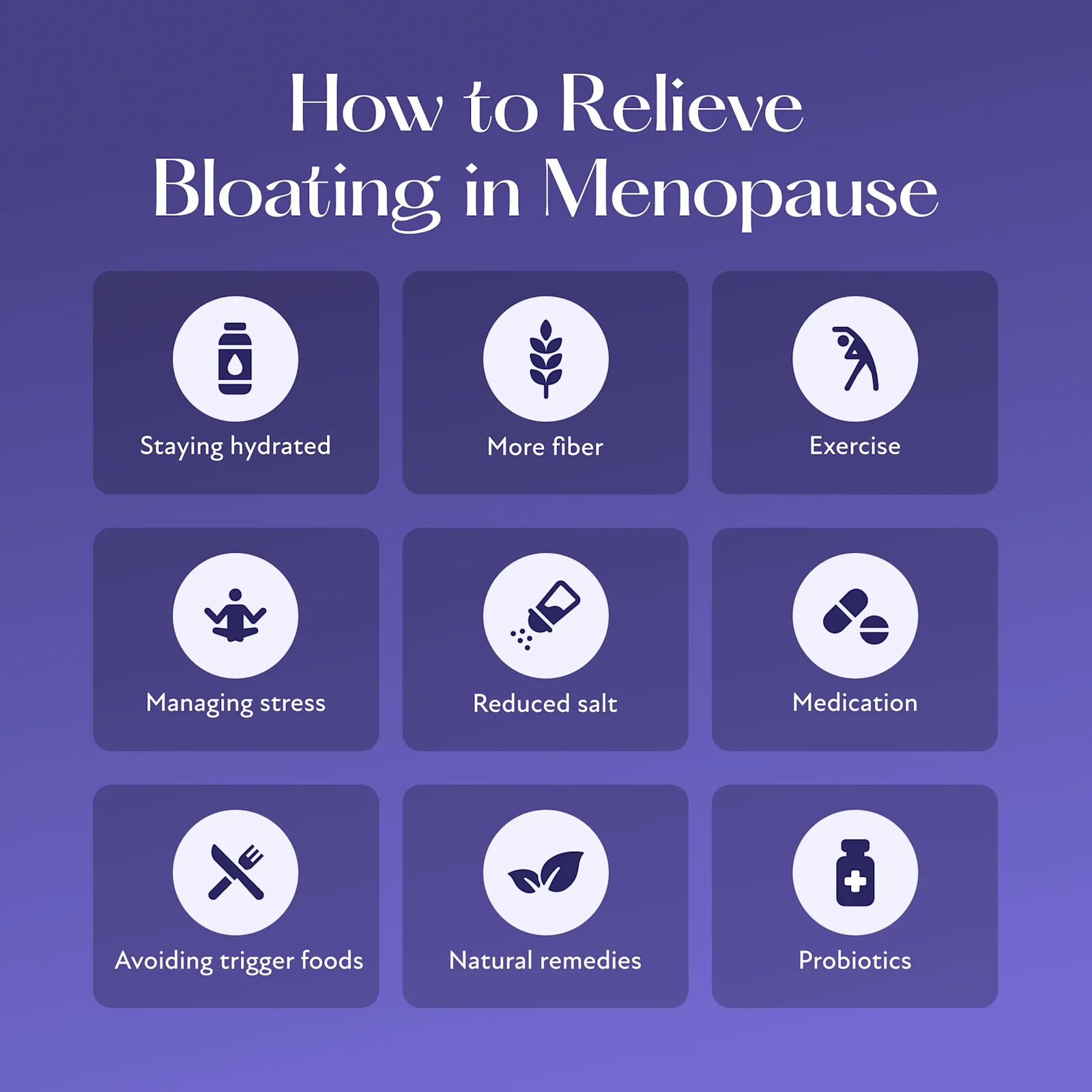Up to 70% of women experience digestive issues like bloating, constipation, and IBS during menopause. The drop in hormones plays a major role in these symptoms. Surprisingly, nearly 60% of women with bloating never seek help, even though these issues are common and disruptive to daily life. Diet, stress, and pre-existing conditions can all make symptoms worse, but understanding how menopause affects digestion is the first step toward finding relief.(1)(3)(8)
When does menopause bloating occur?
Menopause bloating can start during perimenopause and continue throughout menopause. Fluctuating hormone levels, especially imbalanced estrogen, disrupt normal bodily functions, leading to menopause bloating. Studies show that postmenopausal women are more likely to experience bloating and other gastrointestinal problems, but perimenopausal women can also face similar issues.(2)
What causes menopause bloating?
Hormonal changes are the primary cause of menopause bloating, with two key factors contributing to the condition.
Water Retention: Hormonal shifts during perimenopause, especially fluctuating estrogen levels, are a major cause of water retention. When estrogen spikes, it encourages the body to hold on to water, causing women to feel bloated or swollen, particularly around the belly, hands, and feet. The decline in progesterone adds to this by not balancing out the effects of estrogen, making bloating more noticeable. This water retention often comes and goes with hormonal changes, causing some days to feel worse than others.(1)(2)
Gas Retention: As estrogen and progesterone fluctuate, the muscles in the digestive tract may slow down, delaying digestion and increasing gas production. On top of that, changes in hormone levels can throw off the balance of gut bacteria, causing more gas production. Women often notice this after meals, especially if they’ve eaten something harder to digest like fiber-rich or fatty foods.(2)(4)(6)
Menopause Bloating Symptoms
Common menopause bloating symptoms include the following:
Fullness or tightness in the abdomen
Swelling or distention in the stomach
Pressure or discomfort in the belly
Clothing fitting more snugly around the waist
These symptoms can vary widely from person to person — some may experience constant bloating, while others may feel it in waves throughout the day. While these sensations are a normal part of the transition, the discomfort can still be frustrating, particularly if it affects daily routines or food and clothing choices.(2)(4)(5)(6)(7)
Managing Menopause Bloating
While menopause belly bloating can be uncomfortable, several strategies can help manage the symptoms:(4)(5)(6)(7)
Dietary Changes: Certain foods — like cruciferous vegetables, beans, and dairy — can increase bloating. A low-FODMAP diet, which has been shown to reduce symptoms of IBS and bloating in menopausal women, could be beneficial. Probiotics for menopause bloating can also help regulate gut bacteria and alleviate symptoms.
Increased Fiber: Incorporating high-fiber foods supports regular bowel movements and prevents constipation, which is another cause of bloating and swelling. Foods like whole grains, fruits, and vegetables are great choices. But it’s important for fiber to be accompanied by plenty of water; otherwise, it can cause constipation and bloating.
Hydration: Drinking plenty of water helps reduce water retention and flush out excess salt, alleviating stomach bloating.
Lower Salt Intake: Reducing sodium prevents water retention. Excessive salt intake can make bloating worse. Cutting back on processed foods and salt can have a significant impact.
Stress Management: Stress wreaks havoc on digestion, worsening gas and bloating. Regular practices like yoga, meditation, and breathing exercises can help manage stress levels and improve digestive function
Exercise: Regular physical activity promotes healthy digestion and prevents gas from building up in the intestines. Even a daily walk can have a significant impact on reducing menopause gas and bloating.

Can medication help with menopause bloating?
While natural remedies for menopause bloating can be effective, some over-the-counter medications can help reduce gas-related bloating. However, it’s essential to consult a healthcare provider before taking any new medications. In more difficult cases, hormone replacement therapy (HRT) can help regulate hormonal imbalances that cause bloating.(2)(7)
Experiencing bloating during menopause? Discover if HRT is right for you.
For some women, bioidentical HRT can offer relief from bloating by addressing the root cause: hormonal imbalance. Studies indicate that balancing estrogen and progesterone levels with HRT can reduce bloating and alleviate other menopause symptoms.(7)(9)
Menopause bloating is a common issue, but it doesn’t have to be overwhelming. By making dietary changes, managing stress, and incorporating remedies like probiotics and regular exercise, women can reduce bloating symptoms. Bloating may be a natural part of the menopause transition, but with the right strategies, it’s possible to take back control and feel more like yourself again.
If you’ve entered the menopause transition and are struggling with bloating, don’t suffer in silence. Take our brief menopause quiz to see if you’re an eligible candidate for HRT. Get started with Winona to take the first step toward feeling better.